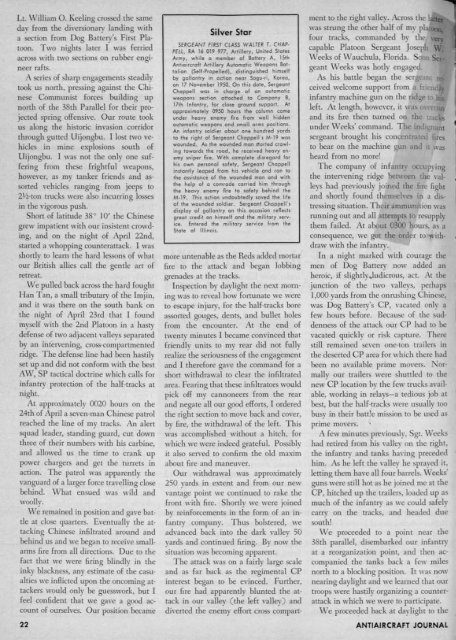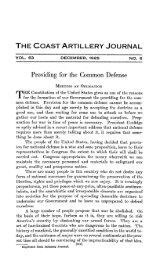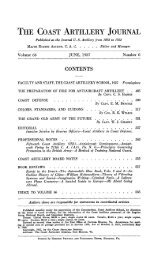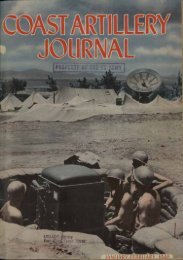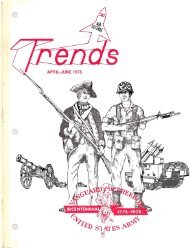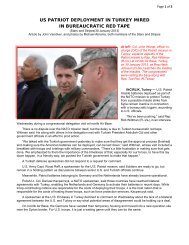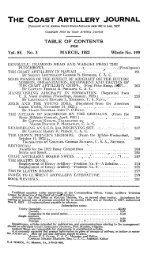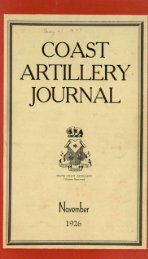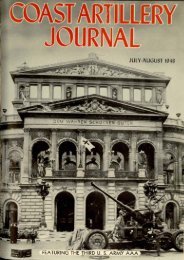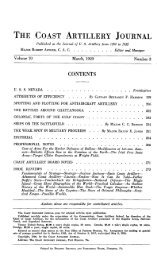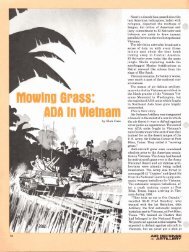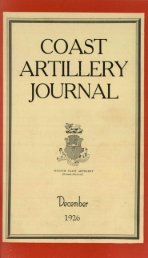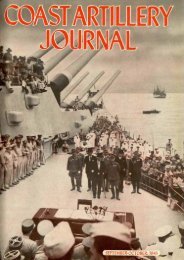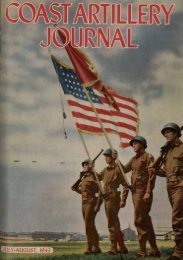July-August - Air Defense Artillery
July-August - Air Defense Artillery
July-August - Air Defense Artillery
Create successful ePaper yourself
Turn your PDF publications into a flip-book with our unique Google optimized e-Paper software.
Lt. \ Villiam O. Keeling crossed the same<br />
day from the diversionary landing with<br />
a section from Dog Battery's First Platoon.<br />
Two nights later I was ferried<br />
across with two sections on rubber engineer<br />
rafts.<br />
A series of sharp engagements steadily<br />
took us north, pressing against the Chinese<br />
Communist forces building up<br />
north of the 38th Parallel for their projected<br />
spring offensive. Our route took<br />
us along the historic invasion corridor<br />
through gutted Uijongbu. I lost two vehicles<br />
in mine explosions south of<br />
Uijongbu. I was not the only one suffering<br />
from these frightful weapons,<br />
howe,'er, as my tanker friends and assorted<br />
vehicles ranging from jeeps to<br />
2Y.!-ton trucks were also incurring losses<br />
in the vigorous push.<br />
Short of latitude 38 0 10' the Chinese<br />
grew impatient with our insistent crowding,<br />
and on the night of April 22nd,<br />
started a whopping counterattack. I was<br />
shortly to learn the hard lessons of what<br />
our British allies call the gentle art of<br />
retreat.<br />
We pulled back across the hard fought<br />
Han Tan, a small tributary of the Imjin,<br />
and it was there on the south bank on<br />
the night of April 23rd that I found<br />
myself with the 2nd Platoon in a hasty<br />
defense of two adjacent valleys separated<br />
by an intervening, cross-compartmented<br />
ridge. The defense line had been hastily<br />
set up and did not conform with the best<br />
AvV, SP tactical doctrine which calls for<br />
infantry protection of the half-tracks at<br />
night.<br />
At approximately 0020 hours on the<br />
24th of April a seven-man Chinese patrol<br />
reached the line of my tracks. An alert<br />
squad leader, standing guard, cut down<br />
three of their numbers with his carbine,<br />
and allowed us the time to crank up<br />
power chargers and get the turrets in<br />
action. The patrol was apparently the<br />
vanguard of a larger force travelling close<br />
behind. \Vhat ensued was wild and<br />
woolly.<br />
\Ve remained in position and gave battle<br />
at close quarters. Eventually the attacking<br />
Chinese infiltrated around and<br />
behind us and we began to receive smallarms<br />
fire from all directions. Due to the<br />
fact that we were firing blindly in the<br />
inky blackness, any estimate of the casualties<br />
we inflicted upon the oncoming attackers<br />
would only be guesswork, but I<br />
feel confident that we gave a good account<br />
of ourseh'es. Our position became<br />
22<br />
Silver Star<br />
SERGEANT FIRST CLASS WALTER T. CHAP.<br />
PElL, RA 16 019 977, <strong>Artillery</strong>, United States<br />
Army, while a member af Battery A, 15th<br />
Antiaircraft <strong>Artillery</strong> Autamatic Weapons Battalian<br />
(Self.Prapelled), distinguished himself<br />
by gallantry in actian near Sogu.ri, Korea,<br />
on 17 November 1950. On this date, Sergeant<br />
Chappell was in charge of an autamatic<br />
weapons section attached to Campany B,<br />
17th Infantry, far close ground support. At<br />
approximately 0950 haurs the calumn came<br />
under heavy enemy fire from well hidden<br />
automatic weapons and small arms positions.<br />
An infantry soldier about one hundred yards<br />
to the right of Sergeant Chappell's M.19 was<br />
wounded. As the waunded man "arted crawl.<br />
ing tawards the road, he received heavy en.<br />
emy sniper fire. With complete disregard far<br />
his own personal safety, Sergeant Chappell<br />
instantly leaped from his vehicle and ran to<br />
the assistance of the waunded man and with<br />
the help of a comrade carried him through<br />
the heavy enemy fire to safety behind the<br />
M.19. This action undaubtedly saved the life<br />
of the wounded saldier. Sergeant Chappell's<br />
display of gallantry an this occasion reflects<br />
great credit on himself and the military servo<br />
ice, Entered the military service from the<br />
State af Illinois.<br />
more untenable as the Reds added mortar<br />
fire to the attack and began lobbing<br />
grenades at the tracks.<br />
Inspection by daylight the next morning<br />
was to reveal how fortunate we were<br />
to escape injury, for the half-tracks bore<br />
assorted gouges, dents, and bullet holes<br />
from the encounter. At the end of<br />
twenty minutes I became convinced that<br />
friendl" ... units to m" rear did not full"<br />
realize the seriousness of the engagement<br />
and I therefore gave the command for a<br />
short withdrawal to clear the infiltrated<br />
area. Fearing that these infiltrators would<br />
pick off my cannoneers from the rear<br />
and negate all our good efforts, I ordered<br />
the right section to move back and cover,<br />
by fire, the withdrawal of the left. This<br />
was accomplished without a hitch, for<br />
which we were indeed grateful. Possibly<br />
it also served to confirm<br />
about fire and maneuver.<br />
the old maxim<br />
Our withdrawal was approximately<br />
250 vards in extent and from our new<br />
vantage point we continued to rake the<br />
front with fire. Shortly we were joined<br />
b,' reinforcements in the form of an in.<br />
fantry company. Thus bolstered, we<br />
advanced back into the dark valley 50<br />
yards and continued firing. By now the<br />
situation was becoming apparent.<br />
The attack was on a fairly large scale<br />
and as far back as the regimental CP<br />
interest began to be evinced. Further,<br />
our fire had apparently blunted the attack<br />
in our valley (the left valley) and<br />
di,'erted the enemy effort cross com part-<br />
ment to the right valley. Across the 1<br />
was strung the other half of my pia<br />
four tracks, commanded by the..<br />
capable Platoon Sergeant Joseph<br />
Weeks of Wauchula, Florida. So<br />
geant \Veeks was hotly engaged<br />
As his battle began the ser.... '- r<br />
cei,'ed welcome support from • f<br />
infantry machine gun on the nd~t' ,<br />
left. At length, ho\\'e,'er, it , as I ,<br />
and its fire then turned on the<br />
under \\leeks' command. ThL in,' nt<br />
sergeant brought his conccntr,lte, res<br />
to bear on the machine gun and ,\'as<br />
heard from no more!<br />
The company of infantr.\ oCLllpying<br />
the intervening ridge bet\\cen the valleys<br />
had previously joinc,l the hre fight<br />
and shortly found thcmseh'cs ;n a distressing<br />
situation. Their ammunition was<br />
running out and all attempts to resupply<br />
them failed. At about 0300 hours, as a<br />
consequence, we got the order to withdraw<br />
with the infantry.<br />
In a night marked with courage the<br />
men of Dog Battery now added an<br />
heroic, if slightlyJudicrous, act. r\t the<br />
junction of the two valleys, perhaps<br />
1,000 yards from the onrushing Chinese,<br />
was Dog Battery's CP, vacated only a<br />
few hours before. Because of the suddenness<br />
of the attack our CP had to be<br />
vacated quickly or risk capture. There<br />
still remained seven one-ton trailers in<br />
the deserted CP area for which there had<br />
been no available prime mm'ers. Normally<br />
our trailers were shuttled to the<br />
new CP location by the few trucks avail.<br />
able, working in relays-a tedious job at<br />
best, but the half-tracks were usually too<br />
busy in their batt!e mission to be used as<br />
prime movers.<br />
A few minutes previously, Sgt. \Veeks<br />
had retired from his valley on the right,<br />
the infantry and tanks ha,'ing preceded<br />
him. As he left the valley he sprayed it,<br />
letting them have all four barrels. \Veeks'<br />
guns were still hot as he joined me at the<br />
CP, hitched up the trailers, loaded up as<br />
much of the infantry as we could safely<br />
carryon<br />
south!<br />
the tracks, and headed due<br />
\\le proceeded to a point near the<br />
38th parallel, disembarked our infantry<br />
at a reorganization point, and then accompanied<br />
the tanks back a few miles<br />
north to a blocking position. It was noW<br />
nearing daylight and we learned that our<br />
troops were hastily organizing a counterattack<br />
in which we were to participate.<br />
\Ve proceeded back at daylight to the<br />
ANTIAIRCRAFT JOURNAL


